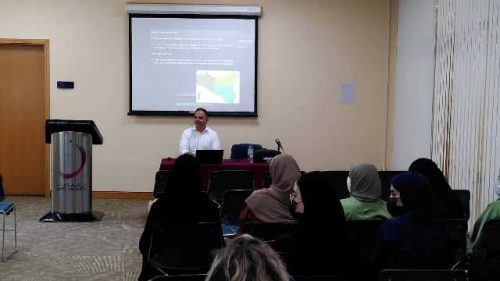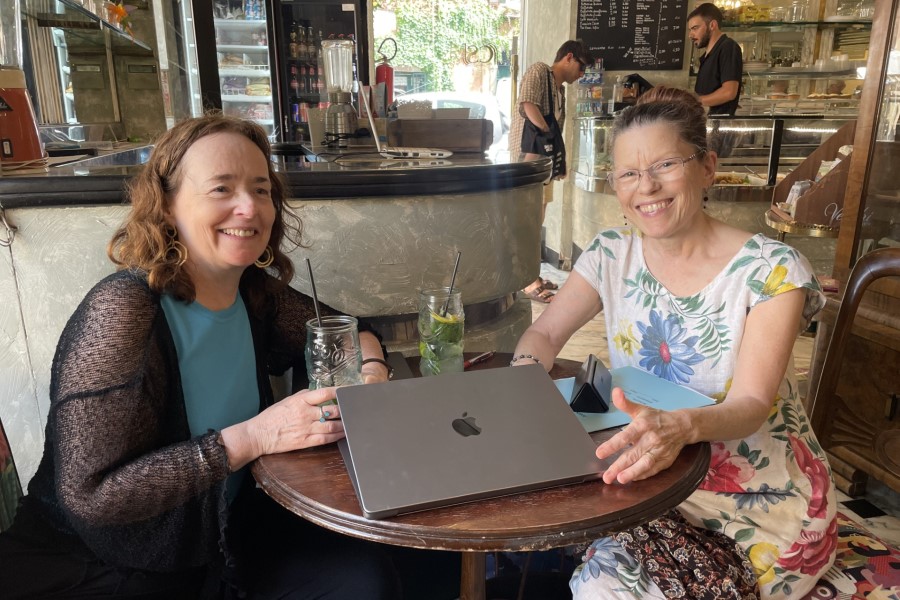Professor Fabrizio Conti Invited as Guest Speaker to Zayed University in the UAE
On August 29 and 30, 2022, JCU History Professor Fabrizio Conti, was invited by Zayed University in the United Arab Emirates to give two research talks, one titled “The Transfer of Knowledge from the Muslim World to Europe in the Middle Ages,” and the other “The Roman Empire and the Exploration of Arabia.” Professor Conti delivered the first talk in the Dubai campus of Zayed University, and the second in the university’s brand-new futuristic campus in Abu Dhabi.

Professor Fabrizio Conti and Dr. David Palfreyman, Assistant Dean for Research and Outreach at Zayed University’s College of Humanities and Social Sciences
“The Transfer of Knowledge from the Muslim World to Europe in the Middle Ages”
In his first talk, Professor Conti discussed the numerous and little-studied channels through which Muslim culture spread throughout Europe between the 9th and 13th centuries. He began by talking about the Muslim conquest of Sicily, which developed important cultural influences on the later Norman kingdom and the German Emperor Frederick II. He then went on to discuss other events, including the project sponsored in Spain in 1142 by the abbot of Cluny Peter the Venerable, which consisted of the translation of several Arabic texts including the first translation of the Quran into a Western language, Latin. The reconstruction of these processes of cultural and political exchange shows many elements fostering dialogue and peaceful coexistence not only between Muslims and Christians, but also with Jews, therefore encouraging the encounter of all three Abrahamic traditions across the Mediterranean Sea in the Medieval period.
“The Roman Empire and the Exploration of Arabia”
In his second talk Professor Conti discussed how, from a historical perspective, the West and the Middle East have never been too far apart. At the time of the Roman emperor Augustus, in the 1st century BCE, interest in the regions located southeast of the empire grew, which led to the organization of a military-exploratory campaign to the southern part of the Arabian Peninsula, the so-called Arabia felix, nowadays Yemen, led by the Roman prefect of Egypt Aelius Gallus. Researchers have very interesting details about this campaign thanks to the information reported by Greek geographer and historian Strabo, which discusses the unsuccessful attempt of Aelius in establishing a long-lasting Roman presence in the Arabian Peninsula. A quasi-ethnographic interest for the region grew, with other sources developing an attention for the cultural, social, and geographical traits of Arabia, such as those discussed by Pliny the Elder or the ones one finds in the fragments of the tract On Arabia by Juba II, the North African king of Numidia and Mauretania. Fruitful commercial as well as political trajectories continued to link the Arabian Peninsula and the ancient Roman Empire, especially along the spice trade root connecting the western world to India through the Red Sea.

Professor Fabrizio Conti lecturing at Zayed University in UAE
Fabrizio Conti (Ph.D. History and Medieval Studies, Central European University, Budapest, 2011) is a lecturer in History at John Cabot University in Rome. He has recently been elected Arts and Humanities Advisor at the American Academy in Rome.
Professor Conti’s teaching and research interests span the Late Antique, Medieval, and Renaissance periods, with an interdisciplinary approach to religious and cultural developments, and a focus on the history of magic and witchcraft. He is also director of the Summer University course on magic & witchcraft at the Central European University in Budapest, Hungary.
Among his publications are the volume co-edited with Elizabeth Ann Pollard Magic in the Roman World (8th c. BCE – 5th c. CE) (Trivent, 2022), the edited volume Civilizations of the Supernatural: Ritual, Witchcraft, and Religious Experience in Late Antique, Medieval, and Renaissance Traditions, with a foreword by Teofilo F. Ruiz (Trivent, 2020), as well as the monograph Witchcraft, Superstition, and Observant Franciscan Preachers: Pastoral Approach and Intellectual Debate in Renaissance Milan (Brepols, 2015).
Professor Conti has worked in the catacombs of Rome as a docent and in the Vatican Secret Archive as an archivist, besides appearing in several TV documentary series.
In Fall 2022 Professor Conti is teaching Introduction to Western Civilization I, The Italian Renaissance, and Magic and Witchcraft in the Medieval and Early Modern Europe at John Cabot University.





